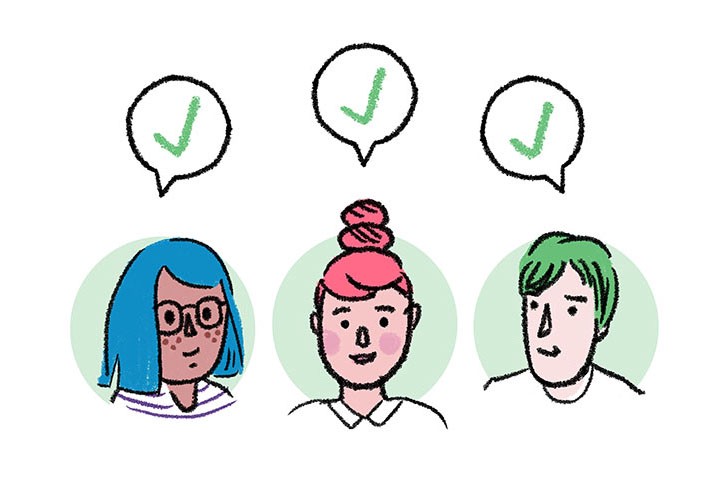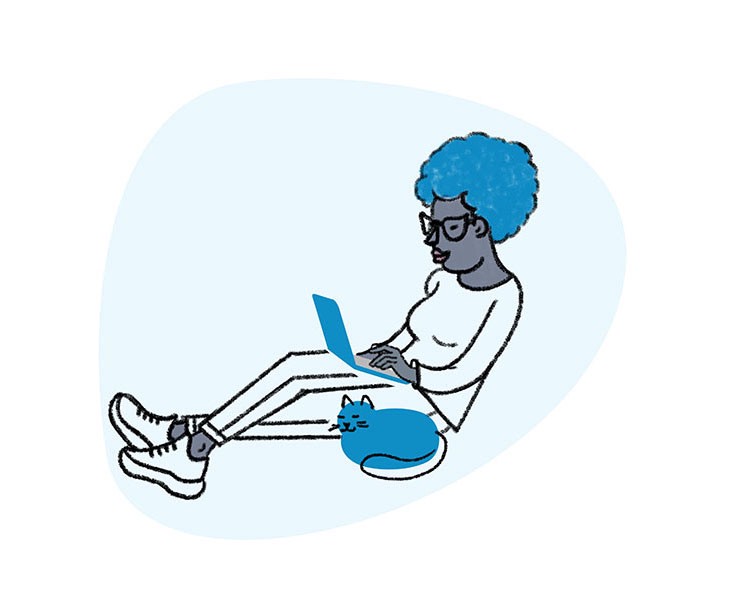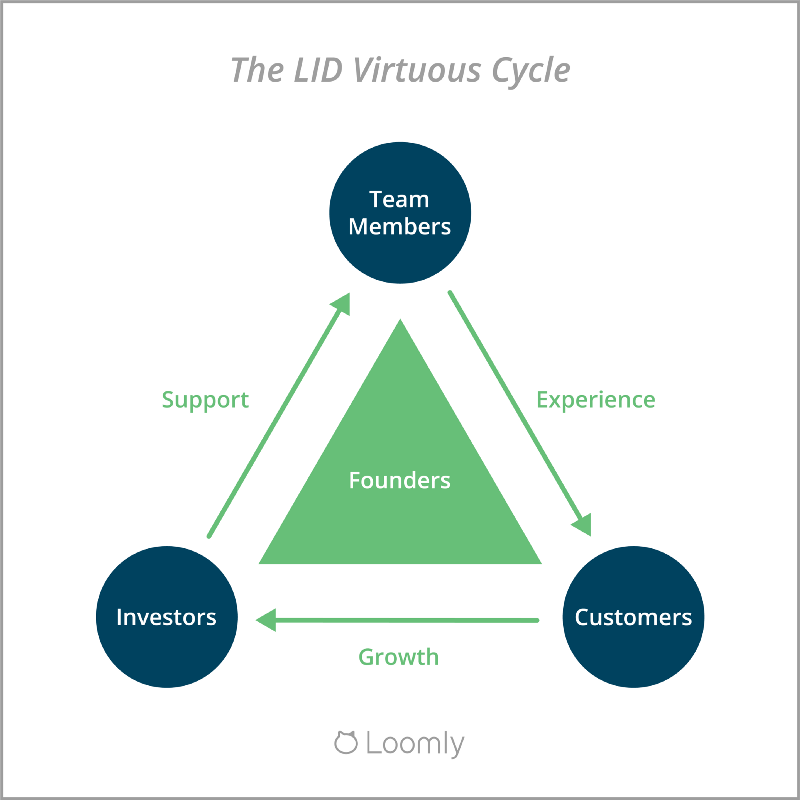TL;DR: in a growth-focused, investors-backed startup, the main goal of the CEO/founders/management is to maximize satisfaction for three families of key stakeholders — investors, customers & team members— and the best way to achieve that goal is to LID: Listen, Inform, Deliver.
A lot has changed at Loomly between our early days as a bootstrapped half-man-show and nowadays as a 10-person, pre-Series A company. In particular, the way Noémie & I spend our days has evolved significantly, from 110% operational duties to increasingly strategy-focused responsibilities.

While we do expect this job-description pattern to reinforce as the company keeps growing, it appears very clear that our number one priority will remain constant: to maximize investors, customers and team members’ happiness.
Interestingly, we have learnt along the way that the key to satisfy every one of our three stakeholder families involves a single, consistent posture. We summed it up as a simple acronym: LID, for Listen, Inform, Deliver.
Here is how this works.
1. Investors
As a rule of thumb, when investors financially support a project, they rightfully expect that project to yield a return, as a reward for the mobilization of their capital (which could have been used elsewhere, potentially yielding another benefit).
At Loomly, we are incredibly lucky to collaborate with amazing investors, who not only invested money in our company, but have also been constantly supporting us with their time, trust and network.
In return (pun intended), we push as hard as we possibly can to make their efforts worthwhile, following the LID approach:
- Inform: in a detailed, monthly email, investors are updated on all aspects of the company, including metrics, product development, marketing campaigns, team growth and fundraising efforts.
- Listen: periodically learning about company’s successes, failures and challenges places investors in a position to offer timely pearls of wisdom, which we naturally want to act on—we do not dread their feedback, we crave it.
- Deliver: the above two-way communication process uniquely empowers us to keep the promises we make in terms of roadmap, metrics and fundraising, and generate the ROI that results from those promises.
And it gets better:
As it turns out, the only way to LID our first family of stakeholders—investors—is actually by LID-ing our second family of stakeholders as well…
2. Customers
According to BusinessDictionary, a customer is:
A party that receives or consumes products (goods or services) and has the ability to choose between different products and suppliers.
At Loomly, we tend to define a customer slightly differently, as:
An individual or a team who suffers from a specific pain point, has a good idea of what the perfect way to fix it would be, but has not found that on the market just yet (however competitive it may be)

This very definition shapes how we interact with our fantastic customers on a daily basis, once again according to the LID principles:
- Listen: we first built Loomly to solve a problem we had, which was a good start. But when you are lucky enough to speak with hundreds of enthusiastic users and customers every day, and they are kind enough to tell you precisely what they want, you just tune in, take notes and adjust your roadmap.
- Deliver: learning from customers enables us to build a platform that gets more useful, ergonomic and reliable every day, improve the quality of the service we provide (when things don’t go as expected) and bundle all the above at a fair price.
- Inform: with such an iterative process in place, it only makes sense to let our customers know when we release new features (which 90% of the time they suggested to us in the first place), run into unforeseen technical issues or update our pricing model. And, amusingly, this keeps fueling the feedback loop ♻.
Want to know the best part?
Drum roll: the only way to LID our second family of stakeholders—customers—is actually by LID-ing our third family of stakeholders, too…
3. Team Members
Loomly would not exist if it wasn’t for the truly extraordinary team showing up day in, day out to make it happen:
Thank you very much Ben, Ari, Mirana, Suzan, Sara, Meilani, Chris & Jason for everything you do.
In fact, even qualifying our collaborators of “truly extraordinary” seems like an understatement to me, when you think that most startups at our revenue stage tend to be 2x-to-4x bigger than we are (in terms of full-time employees).

So, what do you do when you are blessed with the opportunity to work with such talented individuals? You give your best shot at LID-ing:
- Deliver: as much as our startup budget & setting allow it, we aspire to proactively—and sometimes reactively ?—create the conditions where everyone can do their best work. This means market rate compensation, comprehensive benefits, workplace freedom and an ego-free culture.
- Inform: on the one hand, Noémie & I exert ourselves to not only explain what we want to accomplish, but also why we want to accomplish it, highlighting the business reasons behind engineering, design, marketing & support projects. On the other hand, we apply ourselves to transparently share business metrics, on a monthly basis, so that everyone in the company knows where we stand in terms of growth and efficiency, compared to previous months and against forecast, and can measure the contribution of their work.
- Listen: one thing we try to avoid at all cost however, is to tell our team members how to do their job—they simply know better than we do. Once we have set goals and made sure they have all the resources they need (including: knowledge, technology, tools, hires) to move forward, we get out of the way and only show up upon request until QA and approval time.
But here is the kicker:
One of the things that makes it possible to LID our third family of stakeholders—team members—is to have the support from our first family of stakeholders to begin with: investors.
Bottom Line
Listening, Informing & Delivering is our approach to maximize satisfaction for our incredible investors, customers & team members.
These LID principles are also crucial to enter into a virtuous cycle, through which:
- Happy investors support our team.
- Happy team members provide a great experience to customers.
- Happy customers correlate with substantial growth for investors.
- Happy investors Support our team even more…
- … and so on, and so forth.

As the founders of Loomly, Noémie & I are convinced that the essence of our job is to initiate, sustain and amplify this virtuous cycle.
From our perspective, leading a high-growth startup actually boils down to making sure all three key stakeholders families are happy.


